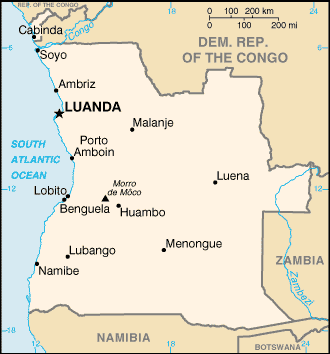Angola
This article is licensed under the GNU Free Documentation License. It uses material from the Wikipedia article "Angola". Map Courtesy CIA World Factbook
a west coast along the Atlantic Ocean. The exclave province Cabinda has a border with Congo-Brazzaville. A former Portuguese colony, it has considerable natural resources, among which oil and diamonds are the most relevant. The country is nominally a democracy and is formally named the Republic of Angola (Portuguese: República de Angola). The name Angola is a Portuguese derivation of the Bantu word N’gola, being the title of the native rulers of the region in the 16th century, at the time of colonization by the Portuguese. In present-day Angola Portugal settled in 1483 at the river Congo, where the Kongo State, Ndongo and Lunda existed. The Kongo State stretched from modern Gabon in the north to the Kwanza River in the south. Portugal established in 1575 a Portuguese colony at Luanda based on the slave trade. The Portuguese gradually took control of the coastal strip throughout the 16th century by a series of treaties and wars. They formed the colony of Angola. The Dutch occupied Luanda from 1641-48, providing a boost for anti-Portuguese states. In 1648 Portugal retook Luanda and initiated a process of military conquest of the Kongo and Ndongo states that ended with Portuguese victory in 1671. Full Portuguese administrative control of the interior didn't occur until the beginning of the 20th century. In 1951 the colony was restyled as an overseas province, also called Portuguese West Africa. When Portugal refused a decolonization process three independence movements emerged:
-the Popular Movement for the Liberation of Angola (Movimento Popular de Libertação de Angola MPLA), with a base among Kimbundu and the mixed-race intelligentsia of Luanda, and links to communist parties in Portugal and the Eastern Bloc -the National Liberation Front of Angola (Frente Nacional de Libertação de Angola, FNLA), with an ethnic base in the Bakongo region of the north and links to the United States and the Mobutu regime in Zaire After a 14 year independence guerrilla war, Angola became independent in 1975. The Portuguese transferred power to the Marxist-inspired MPLA, which received support from the Soviet Union. Shortly after, a civil war broke out between MPLA, UNITA and FNLA. In 1976, the FNLA was defeated by a combination of MPLA and Cuban troops, leaving the Marxist MPLA and the western-backed UNITA to fight for power. In 1991, the factions agreed to turn Angola into a multiparty state, but after the current president José Eduardo dos Santos of MPLA won UN supervised elections, UNITA claimed there was fraud and fighting broke out again. A 1994 peace accord (Lusaka protocol) between the government and UNITA provided for the integration of former UNITA insurgents into the government. A national unity government was installed in 1997, but serious fighting resumed in late 1998, rendering hundreds of thousands of people homeless. President José Eduardo dos Santos suspended the regular functioning of democratic instances due to the conflict. On February 22nd 2002, Jonas Savimbi, the leader of UNITA, was shot dead and a cease-fire was reached by the two factions. UNITA gave up its armed wing and assumed the role of major opposition party. Although the political situation of the country seems to be normalizing, president dos Santos still hasn't allowed regular democratic processes to take place. Among Angola's major problems are a serious humanitarian crisis (a result of the prolonged war), the abundance of mine fields, and the actions of guerrilla movements fighting for the independence of the northern enclave of Cabinda (Frente para a Libertação do Enclave de Cabinda). Angola, like many sub-Saharan nations, is subject to periodic outbreaks of infectious diseases. As of early April 2005, Angola is in the midst of an outbreak of the Marburg virus which is rapidly becoming the worst outbreak of a hemmorhagic fever in recorded history, with over 237 deaths recorded out of 261 reported cases, and having spread to 7 out of the 18 provinces as of April 19, 2005. |
||||||||||||
 African Animals |
||||||||||||
 Angola is a country in southwestern Africa bordering Namibia, Congo-Kinshasa, and Zambia, and with
Angola is a country in southwestern Africa bordering Namibia, Congo-Kinshasa, and Zambia, and with